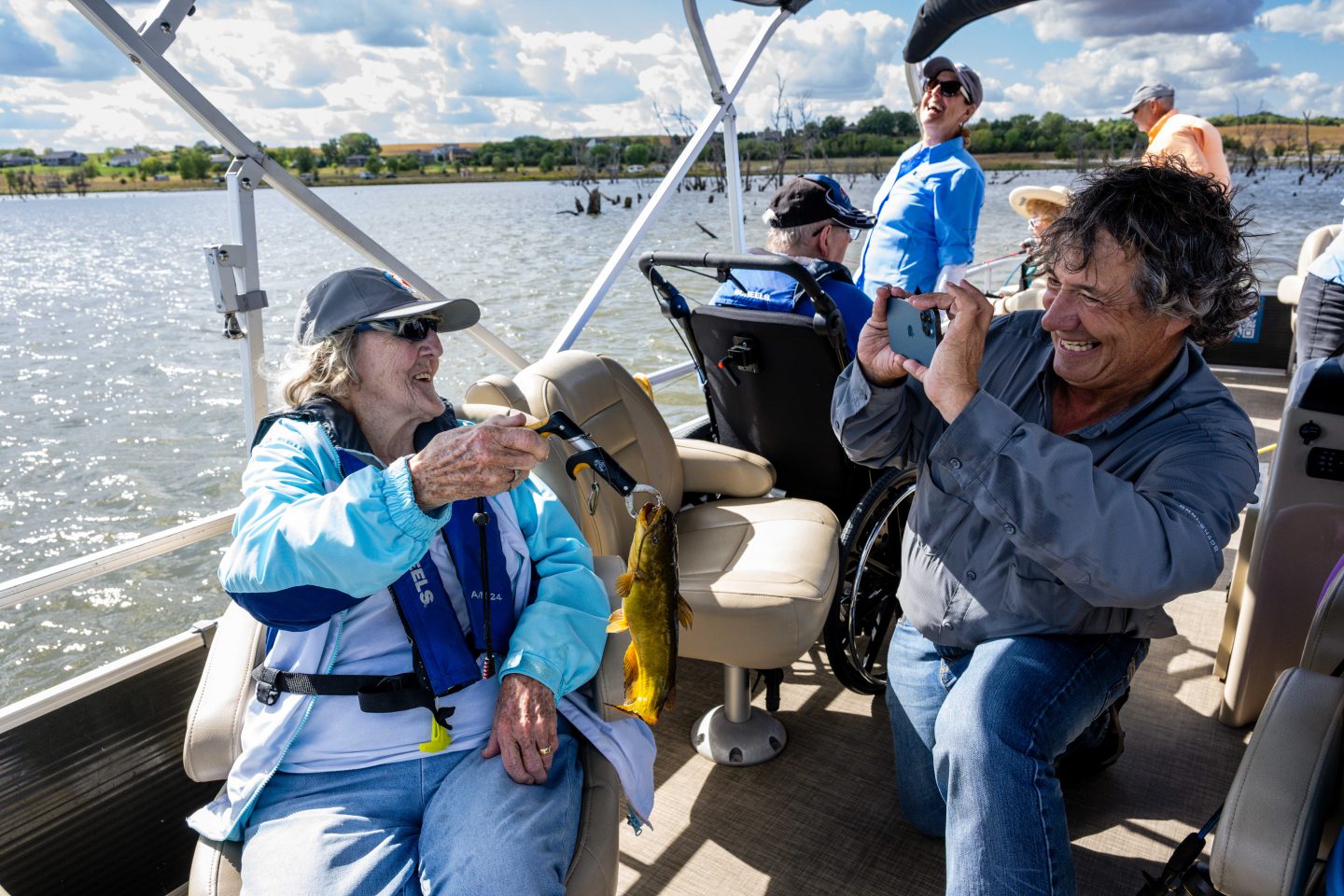
Story and photos by Eric Fowler
World War II veterans. Ninety-year-old nursing home residents who had never fished and caught their first fish. Hospice patients who caught their last. Alzheimer’s patients. Twenty-somethings who have been blind since they were infants. Youths from the Boys & Girls Clubs in Omaha. Those are some of the nearly 10,000 individuals who have boarded the Live Well. Go Fish. boat.
The Lincoln nonprofit knows the therapeutic value of fishing and simply being on the water. The people they serve have lost plenty of bobbers, but they also have caught plenty of fish, and shared an untold number of smiles.
Retirement Gig
Live Well. Go Fish. is David Ruder’s retirement venture. When he left his career, he thought he might be a fishing guide, but then came u p with a better idea: guiding seniors, veterans and others who wouldn’t otherwise have a chance to fish.
“There are a lot of programs already out there for the kids, but there’s just not a lot for mainly the seniors and people with disabilities,” Ruder said.
In 2016, Ruder started knocking on the doors of care, retirement and veterans’ services centers to see if they would be interested. Enough of them were that Ruder formed a nonprofit and ordered a custom-made, U.S.-Coast-Guard-approved 26-foot pontoon boat that could accommodate up to three wheelchairs. He recruited some volunteers, and in 2017, started fishing. All but a few trips have been at Lake Wanahoo near Wahoo. The nonprofit now serves about 75 care facilities and organizations from 17 counties in eastern Nebraska and western Iowa.
Ruder is not only the CEO of the organization, he is also the on-board entertainment, armed with plenty of bad dad jokes like “Why are the fish so smart? Because they’ve been in school all day.” He’s also the DJ, starting each trip with a patriotic song as a salute to veterans, followed by various fishing-related songs and assorted tunes to fit the crowd. There is plenty of dancing, even for those who can’t stand and swing with a volunteer from their boat seat.
During each cruise, they break out the bubble machines and fire up “Tiny Bubbles” by Don Ho, often for the entertainment of shore anglers. As they move parallel to U.S. Highway 77 on the dam at Wanahoo, they all turn into kids, pump their arms and see how many semi-tractor trailer drivers they can get to blow their horns — many do. They fly a kite from a fishing pole.
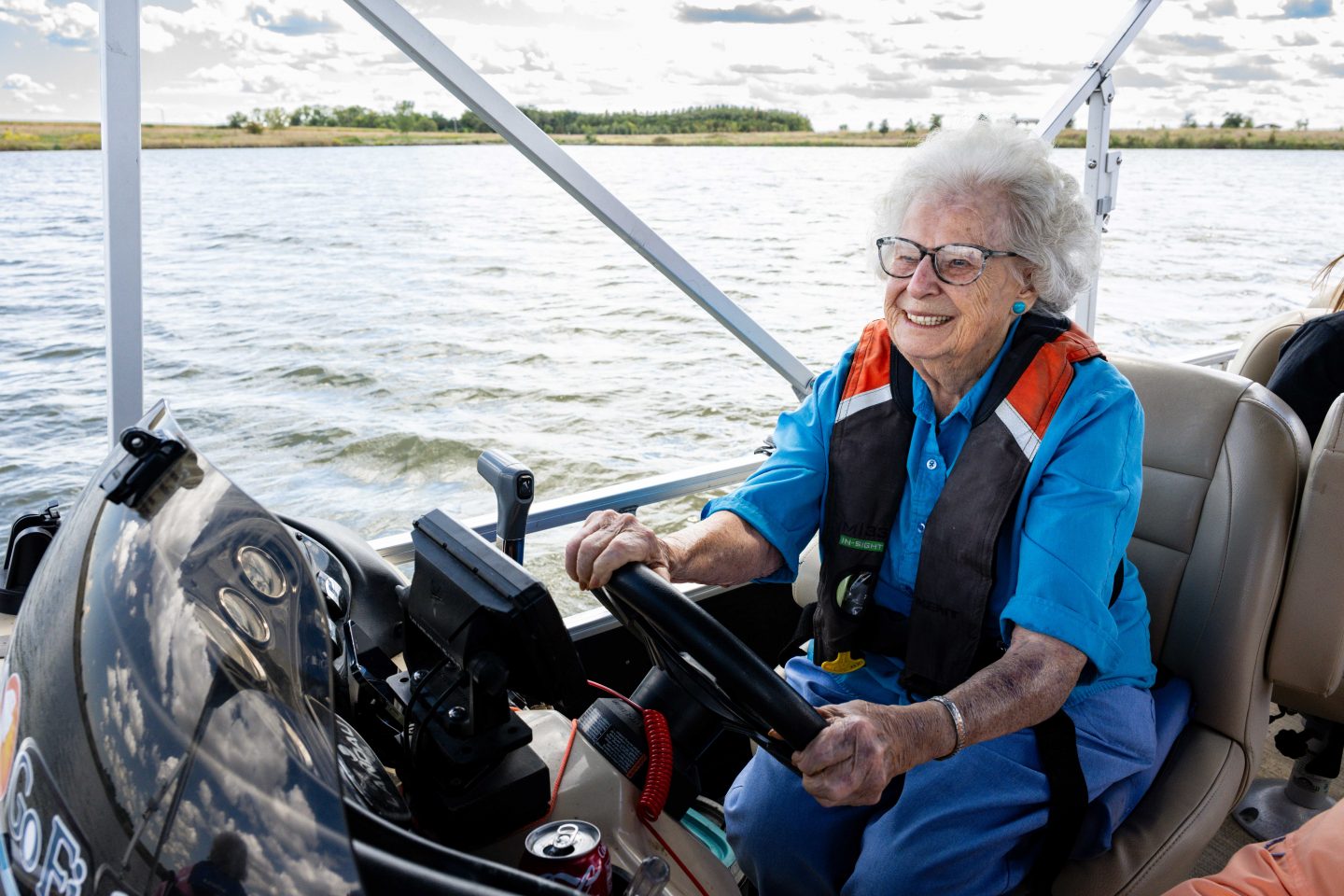
Early on, some people who had signed up for a trip would cancel when they found it conflicted with their regular bingo game. So Ruder and company came up with Bobber Bingo, passing out cards, dumping a bucket of bobbers marked with letters and numbers overboard and fishing them out with a dip net.
He is the official photographer for the voyages, posting stills and videos on social media. He took one step too far back one day and fell off the dock while taking a photo of residents from a West Point retirement home and volunteers. He was trying to make sure he got all 12 people in after realizing their ages added up to 1,137, a record. Other records include the longest married couple (73 years) and the longest serving veteran (41 years).
The Seniors
One of the first groups to join them on Lake Wanahoo was from Saunders Medical Center Long Term Care in Wahoo. They have been with them ever since.
“I could sit here all day,” Joyce McIntosh, a resident of the center, said on an outing last summer. “It’s just peaceful. I forget about the whole world … Who would want anything more?”
On that day, Shirley Schoenrock did, “I can’t catch the bugger,” she said, annoyed by the small fish nipping at her baited hook hanging below the boat.
Both women had fished creeks or ponds growing up and relived experiences, including McIntosh’s dad stocking fish in the three ponds built on their farm, and Schoenrock catching bullheads for breakfast.
As an adult, Schoenrock couldn’t ski, so she drove the boat when her family went to the lake on Sundays. She’s driven the boat nearly every time she’s been out with the Live Well. Go Fish. crew. They presented her with two awards on the same trip last year: One was for Honorary Captain. The other was for Ornery Captain.
Joking around and friendly banter are part of each trip. Saunders residents and staff were quick to point out that Dorothy Sorensen was a noted cheat at bingo. “This is a new experience,” she said with a wry smile. “Cheating at fishing, it’s a little difficult.”
She had a plan, though. While she didn’t catch a fish, she already knew what she would tell others back at the center. “I got several,” she said. “They weren’t too big, but there were 5 or 6. I’ll explain it when we get back.”
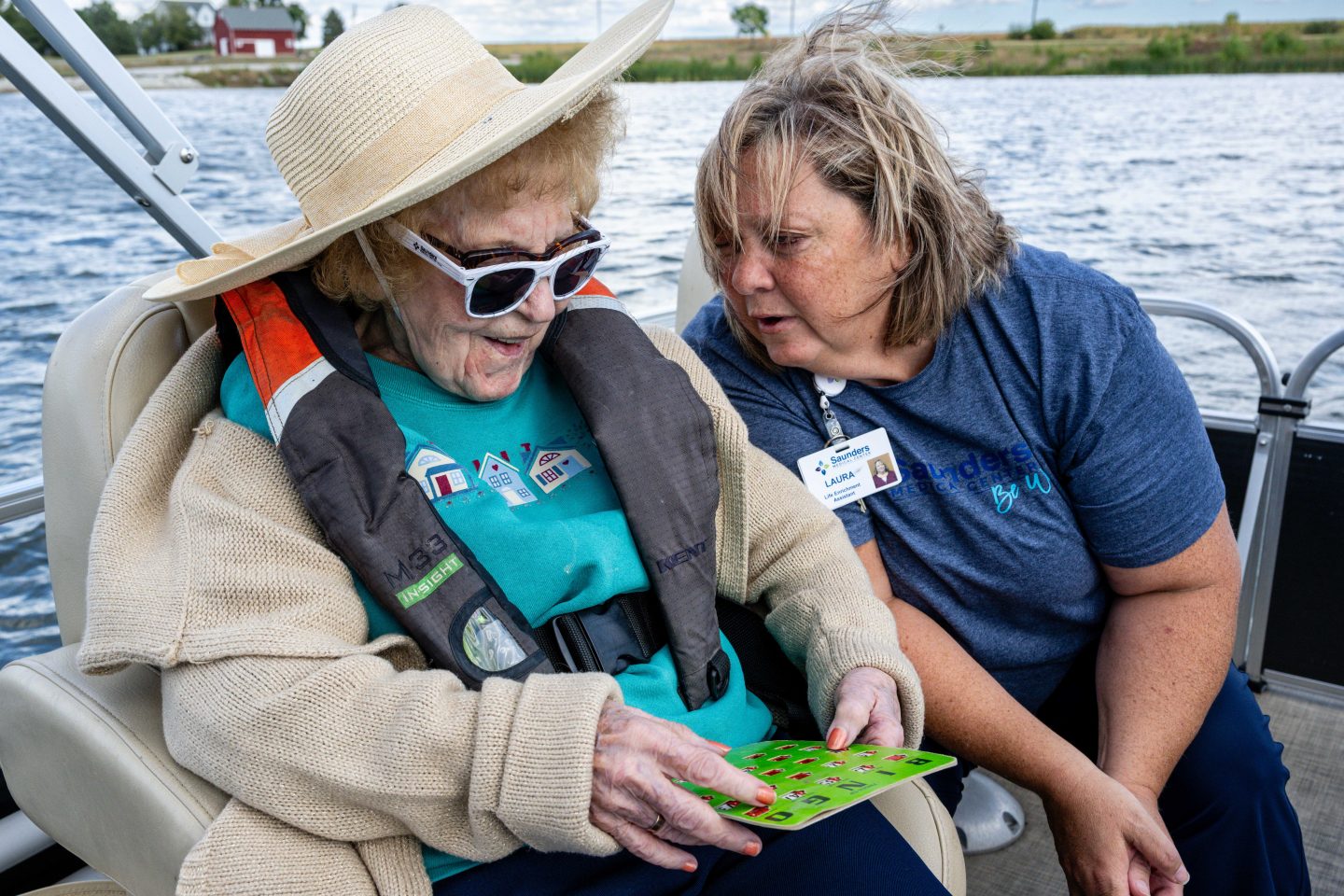
Water Therapy
The value of the recreational therapy for participants, whether they are residents in assisted living homes, under memory care for Alzheimer’s or dementia, or at a home for a short time for rehabilitation, can’t be understated.
“It’s hard,” said Kayla Massa, life enrichment coordinator at Saunders. “A lot of them lose a lot of freedom the second they walk in here. Just being able to get them out there just to kind of feel alive again, honestly, it’s one of the best things that I’ve ever been able to do for them.”
Some residents simply go out and take a nap in the sun. Some are eager to go every time. They all talk about their trips for days.
Laura Eivins, another enrichment coordinator at the center, was on one of the first Live Well. Go Fish. voyages. She has many memories of those who have participated, but one sticks with her of a couple who were regulars on the boat. The husband was a lifelong angler living on his own, but joined his wife, a resident at the center, who simply enjoyed sitting back and watching her husband fish. When he died, she was reluctant to get back on the boat.
“I told her she needed to do that as a tribute to her husband,” Eivins said. “The first time back I held her, and we shed a lot of tears. It was very emotional but, at the same time, very healing for her.”
The Last Fish
Live Well. Go Fish. grew to accommodate patients in hospice care. That led to a partnership with the Dreamweaver Foundation, an Omaha-based group that, among other things, helps make bucket-list wishes come true for older adults and others with life-limiting illnesses.
Initially, Ruder wasn’t sure whether volunteers would want to work with hospice patients. Those trips “kind of tore your heart out,” he said, but are some the most rewarding for the volunteers because of what it means for the patients and their families. Together, they came up with a motto: “Everybody remembers their first fish. We try to make sure nobody forgets their last.”
Some participants include a young man who was an avid hunter and angler but is now confined to a wheelchair by illness; he wanted to spend a day fishing with friends. A 74-year-old woman simply wanted to go on a boat ride with her family. A 95-year-old man wanted to fish with his great-grandson. Another grew up fishing with his brother and wanted to spend one more day on the water, enjoying nature, sipping on a cold beer. Some Dreamweaver participants arrive at Lake Wanahoo in an ambulance. Others, or their family and friends, arrive in limousines.
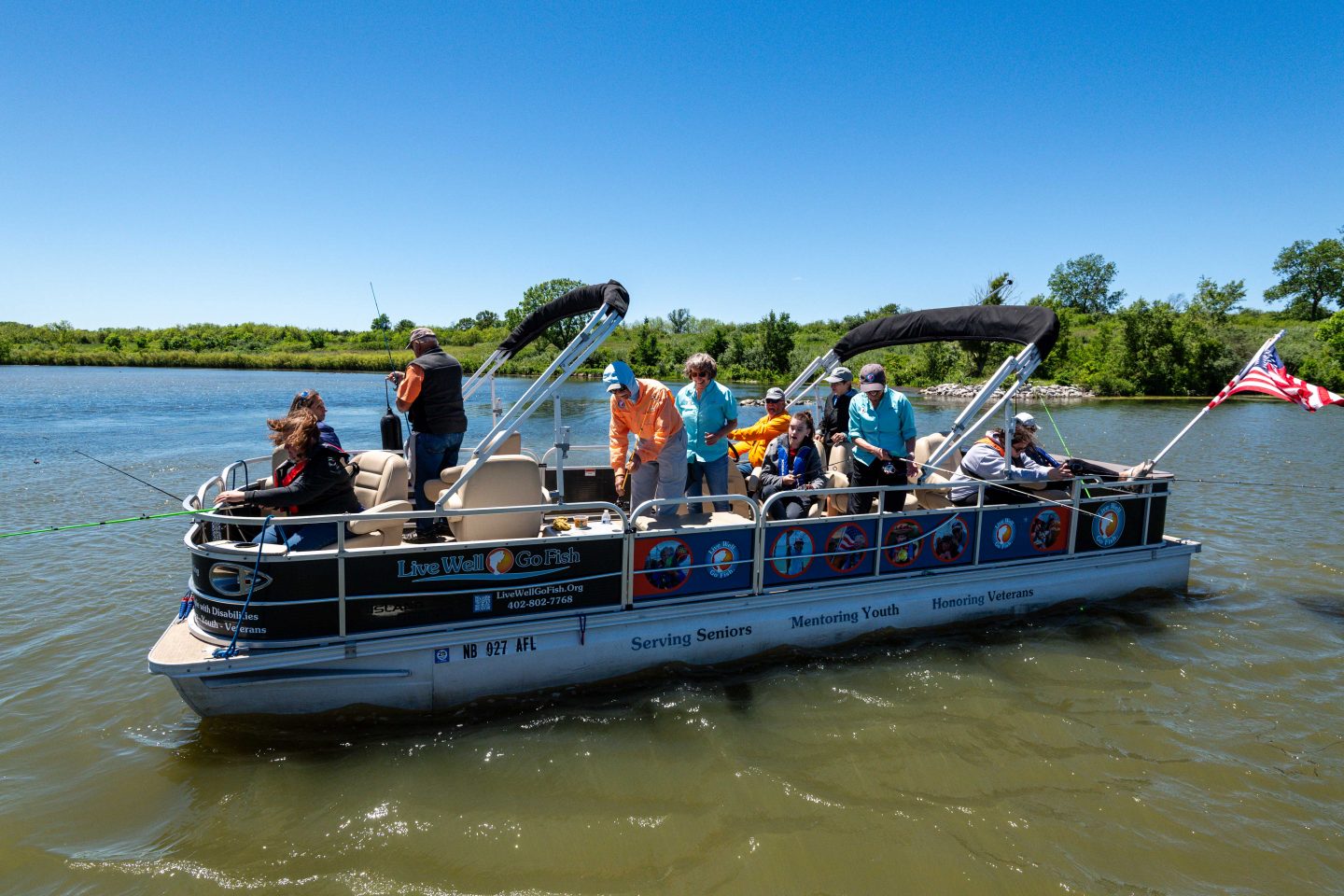
Covid Shift
Coronavirus shut Live Well. Go Fish. down for a time. When it resumed operations, there were concerns about the lingering health risks to seniors, which had made up 90 percent of the clientele. So Ruder and the board reached out to other organizations serving special needs patients, which led to a relationship with the Nebraska Commission for the Blind and Visually Impaired. That group in 2023 set the record for the most fish caught in an outing: 128, including 81 by one boat.
Jon Herron, blind since 2021, was on that trip. The 62-year-old retired U.S. Air Force officer remembers spending summer days catching sunfish from a creek near his home, but hadn’t since. “I would say it can be harder without vision, but what you want to do is to use your sense of touch. So when one sense goes away, the other senses kick in,” he said. “So my hearing is better now, my sense of smell is better now, my sense of touch is better now.”
“In order to read the braille and stuff, you really do have to have sensitive fingers,” said Makenzie Gray, 23, who lost her eyesight when she was 6 months old. “My fingers are very sensitive.”
Gray has been fishing with Live Well. Go Fish. since 2021. “I love to be on boats,” she said. “The fishing is pretty fun. I absolutely love this program.”
Honoring Veterans
Veterans are a big part of Live Well. Go Fish. The American flag always flies from the back of the boat. There are days set aside to honor those who have served in different wars, including the Women’s Army Corps. Ruder didn’t serve but had uncles who did, including one who died in Korea. He and the volunteers appreciate those who did, and the freedom they fought to defend. “We wouldn’t be doing this without them,” he said.
The group works with veterans homes, county veterans’ services offices, nonprofits and hospice groups that work with veterans, VFW and American Legion clubs, and Women’s and Family auxiliary groups.
Ruder is still amazed by the group of four World War II veterans they hosted on D-Day in 2018. On the boat was a soldier who landed on Normandy Beach in France and then marched into Berlin, another who worked undercover as a spy in a German concentration camp, and one who helped liberate those camps.
Some of the Live Well. Go Fish. volunteers are veterans who enjoy working with veterans. Better able to relate to each other, guides and passengers are apt to open up and share stories they might not share with others.
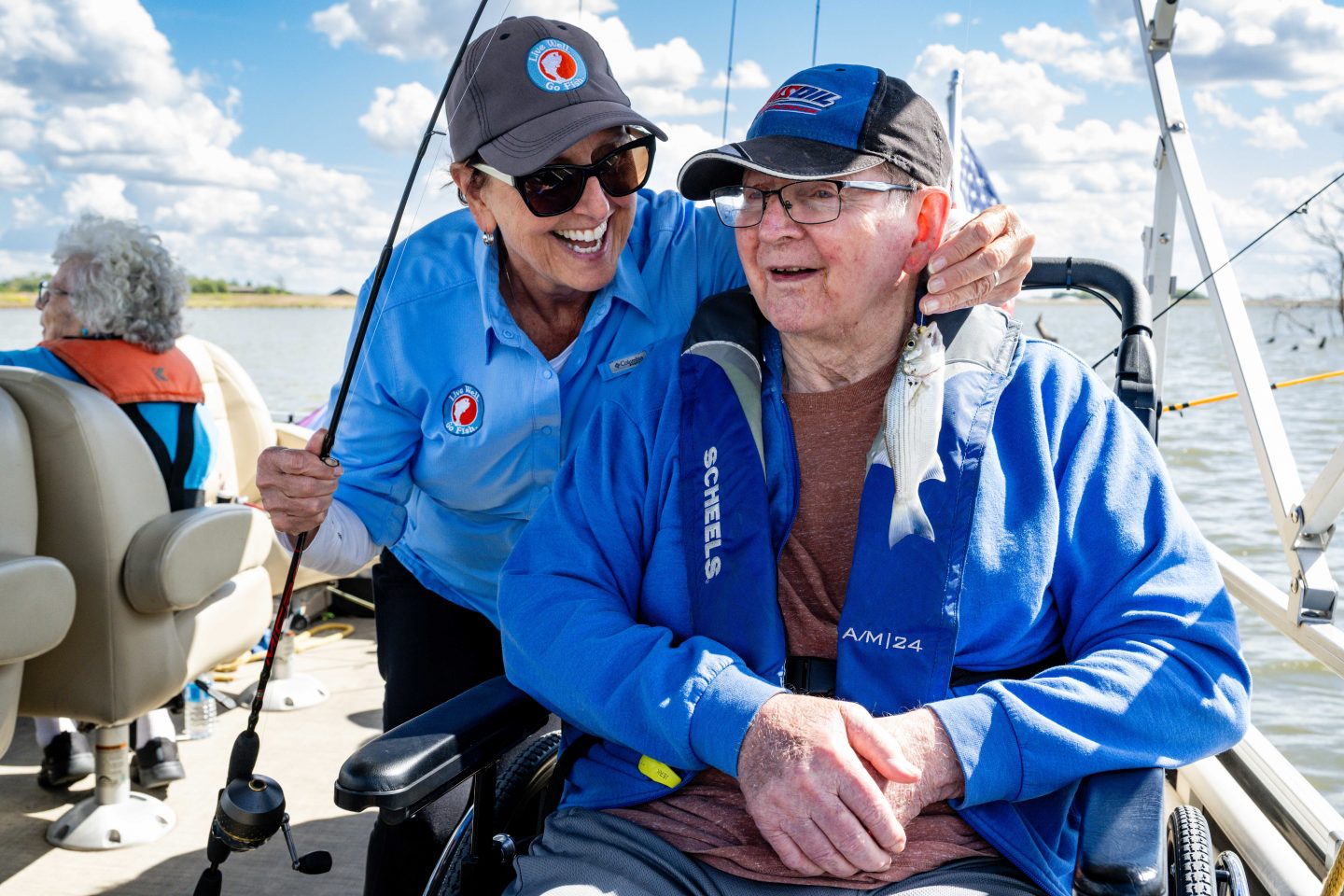
The Volunteers
Ruder is the only paid member of Live Well. Go Fish. Helping him are 48 volunteers, who come from as far away as Nebraska City and West Point and last year donated nearly 1,500 hours of their time to the program.
“This program works because of the volunteers,” Ruder said. “You see them catch a fish and they hand the rod to somebody. They’re not in it for themselves.”
Tom Lanz is a longtime volunteer hunter education instructor for the Nebraska Game and Parks Commission and has mentored many young hunters and anglers.
He often saw Ruder and the Live Well. Go Fish. boat when he was fishing at Lake Wanahoo. After learning what the group was about, he told Ruder he would be happy to help if they ever needed him. He’s now a member of the board of directors.
“I’ll tell you what, it’s about as rewarding as anything you can do,” Lanz said. “Everybody does a lot of things for kids, and that’s the future of hunting and fishing. But there’s a little bit of payback for a lot of these elderly people and the people who can’t get out.”
It brings things full-circle Lanz said, just as taking his elderly grandfather fishing decades after he taught him to hunt and fish did.
Beth Alberts and Carla Hiatt both worked with Live Well. Go Fish. when they were activities directors at retirement villages in Lincoln. Hiatt never got to go on the boat. “Our van was always full and I wanted our residents to go,” she said. “So, when I retired, I said I want to volunteer.”
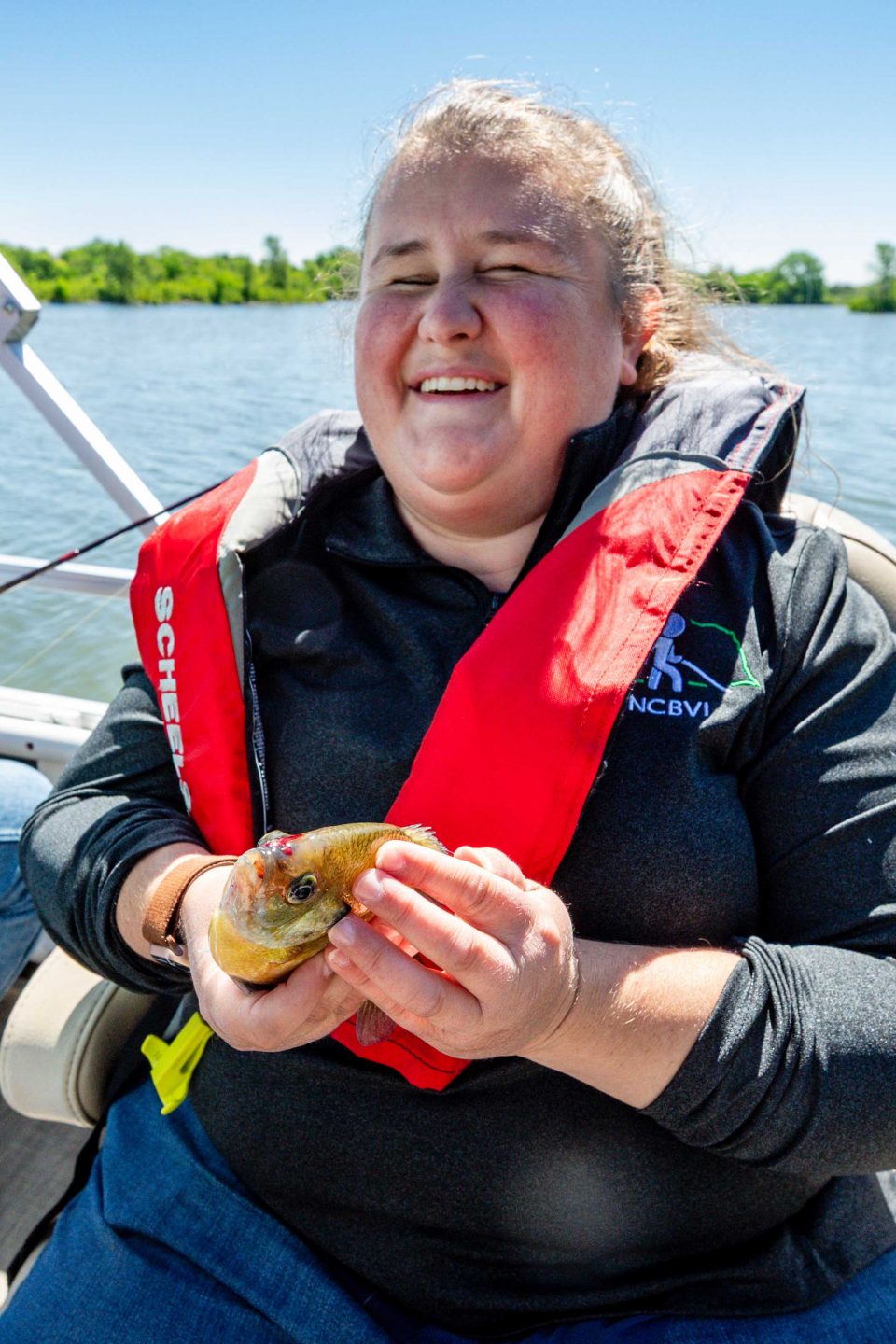
Alberts did the same. The two appreciate the smiles they see on the boat, especially from memory care patients who struggle remembering parts of their past or current day-to-day lives, but can sing along with many of the songs Ruder asks Siri to play, and the other memories the trips spark. “They don’t really know what they are getting into, but then when they get here, they are like, ‘I was at Johnson Lake.’ Or they say, ‘Oh we used to go to Minnesota.’ Or ‘We used to go to Canada fishing.’ It just brings back so many memories,” Alberts said.
“It just fills my heart every time I step off the boat.”
The Future
Care homes pay a fee to the organization that helps cover the cost of the boat, insurance and other expenses. Donations from individuals and corporations pay the fee for veterans and other groups. Ruder said he believes there is enough demand and support for the program that it could expand, forming chapters in different communities. “This is probably never going to be a Pheasants Forever or a Ducks Unlimited, but I think it could be,” he said.
Last year, Live Well. Go Fish. brought youths from the Boys & Girls Club of the Midlands on board, one of a handful of youth organizations they have served. They work with Apace, formerly Region V Services, which supports people with intellectual and developmental disabilities, and others serving those with special needs. They take cancer patients from an Omaha hospital fishing. And active senior groups such as Aging Partners.
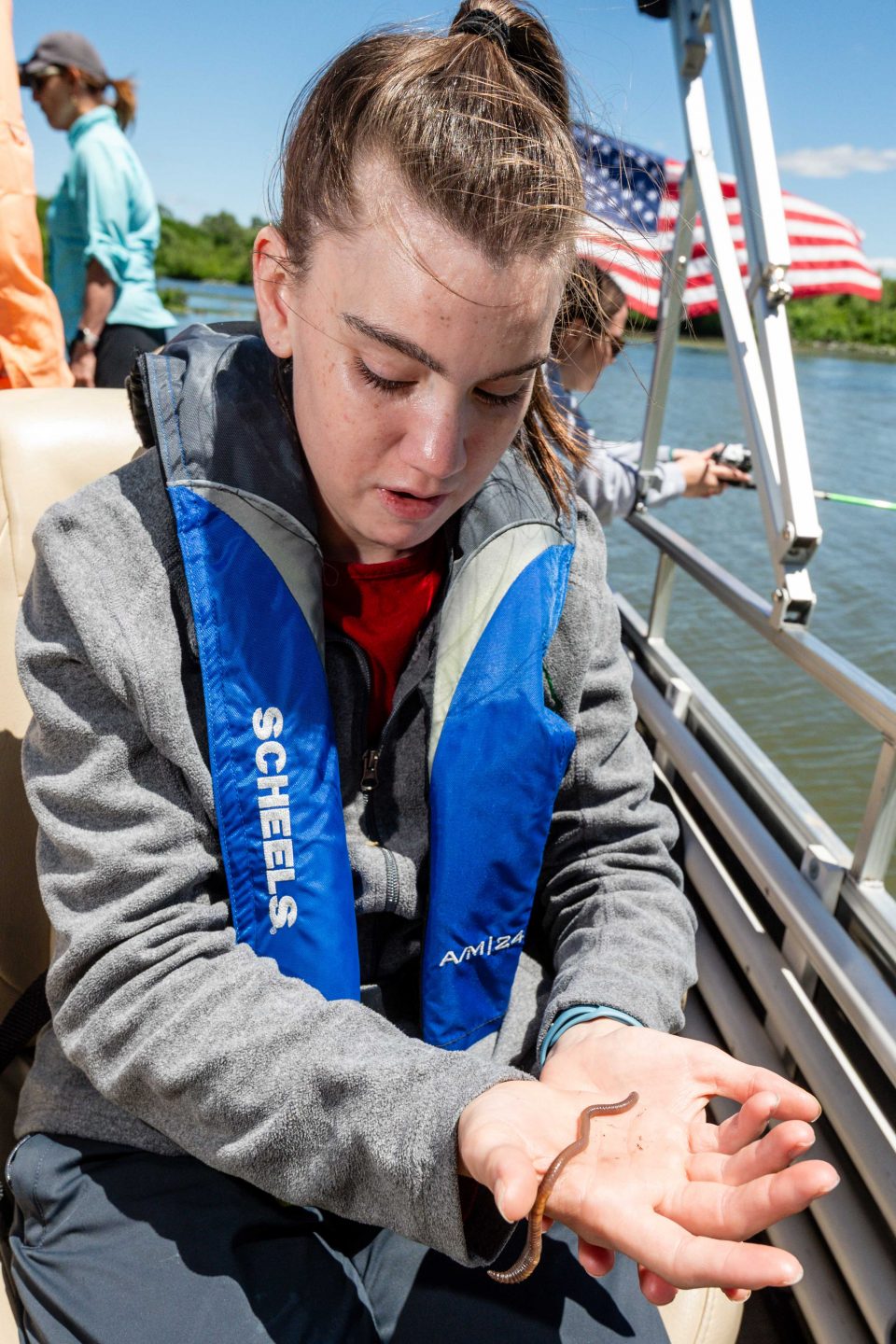
They fish primarily at Lake Wanahoo, settling there to draw from both the Lincoln and Omaha areas, not knowing what the demand would be from just one of the communities. The first year was slow. “We were begging people to try us,” Ruder said. Those who came back told others. Now they host two or more trips a day, most on weekdays, from May to mid-October. Sometime in May, Ruder expects the number of people they have served to top 10,000, a number he didn’t foresee.
The benefits to the seniors, veterans and others who participate extend to the volunteers.
“They’re helping us, too. We learn from them … empathy, care, respect. It unites us,” Ruder said.
“We all go fishing, but the fishing is just a bonus.”
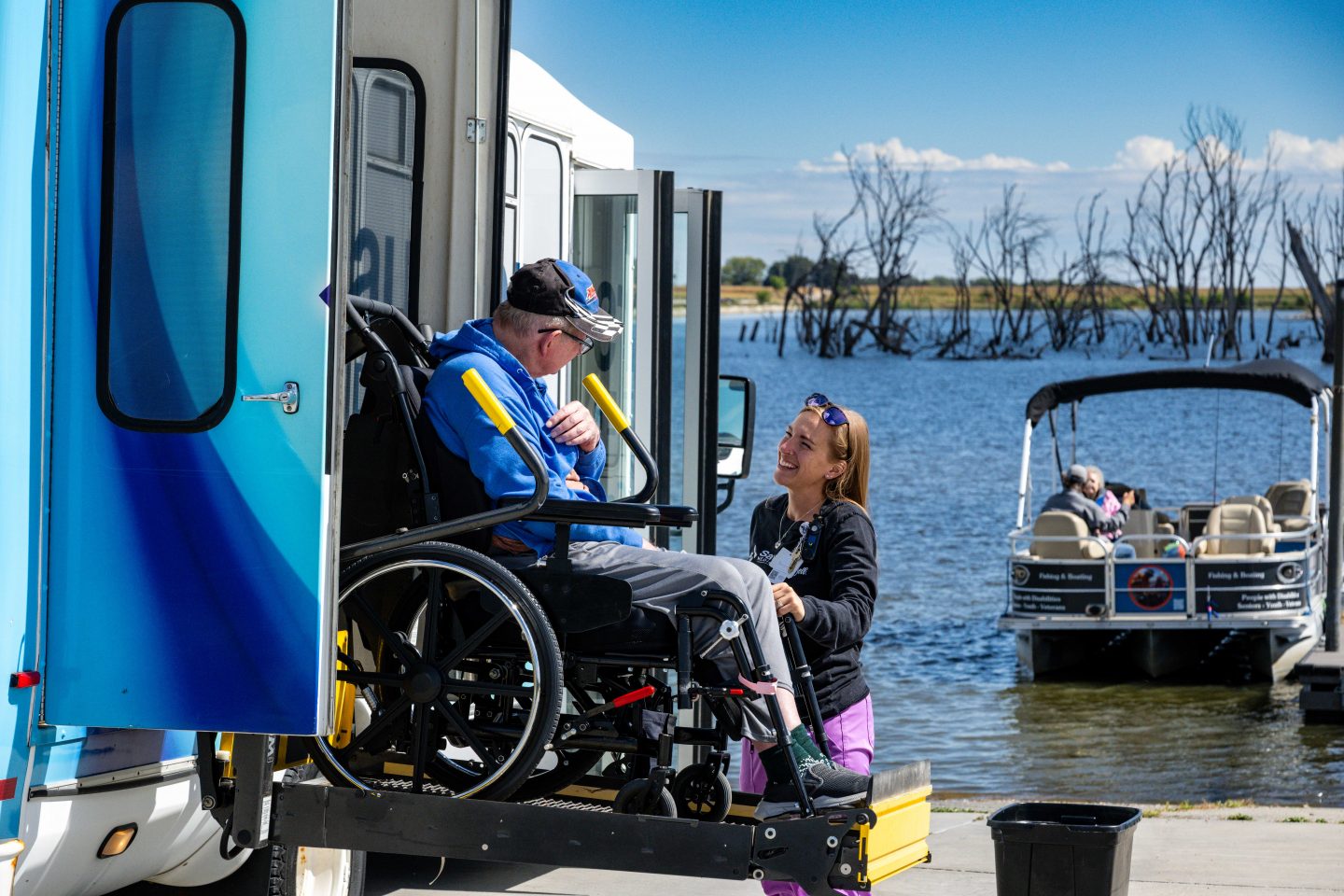
This article was updated on May 27, 2025 to correct the misspelling of David Ruder’s surname.
